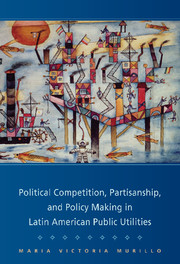Book contents
- Frontmatter
- Contents
- List of Acronyms
- Acknowledgments
- Introduction
- 1 Voice and Light
- 2 Political Competition and Policy Adoption
- 3 Casting a Partisan Light on Regulatory Choices
- 4 Postreform Regulatory Redistribution in Chile
- 5 Postreform Regulatory Redistribution in Argentina and Mexico
- 6 A Multilevel Analysis of Market Reforms in Latin American Public Utilities
- 7 Conclusion
- References
- Index
- Titles in the series
1 - Voice and Light
The Politics of Telecommunications and Electricity Reform
Published online by Cambridge University Press: 05 June 2012
- Frontmatter
- Contents
- List of Acronyms
- Acknowledgments
- Introduction
- 1 Voice and Light
- 2 Political Competition and Policy Adoption
- 3 Casting a Partisan Light on Regulatory Choices
- 4 Postreform Regulatory Redistribution in Chile
- 5 Postreform Regulatory Redistribution in Argentina and Mexico
- 6 A Multilevel Analysis of Market Reforms in Latin American Public Utilities
- 7 Conclusion
- References
- Index
- Titles in the series
Summary
The predominant explanations of market-oriented reforms in Latin America in the late twentieth century emphasize globalization pressures in the form of capital shortages, imported economic ideas, and pressures derived from economic integration. This book incorporates these effects into the analysis of policy making while uncovering the electoral incentives behind reform adoption and content and explaining the evolution of electoral and partisan effects in the immediate postreform period. In so doing, it provides important tools for our assessment of how democratic political processes affect policy making.
This study suggests that citizens' political preferences mattered for public-utility policy making despite external financial pressures at the time of reform (time 1) and, in contexts of high salience, despite the asymmetry of resources and information between residential consumers and private providers in the postreform period (time 2). Political competition and partisan preferences shaped the political dynamics of market-oriented reforms in Latin American public utilities. First, political competition influenced the timing of reforms based on politicians' fear of defection by marginal voters and on the credibility of challengers to provide an alternative policy. Second, the partisan orientation of the incumbent shaped the degree of regulatory control of markets established by reforms based on the demands of core constituencies, politicians' ideological biases, and their delegation to different sets of allied experts. In the postreform period, electoral competition and partisan preferences generated incentives to change the postreform status quo to benefit residential consumers if electoral competition and public salience were high.
- Type
- Chapter
- Information
- Political Competition, Partisanship, and Policy Making in Latin American Public Utilities , pp. 16 - 54Publisher: Cambridge University PressPrint publication year: 2009
- 1
- Cited by

